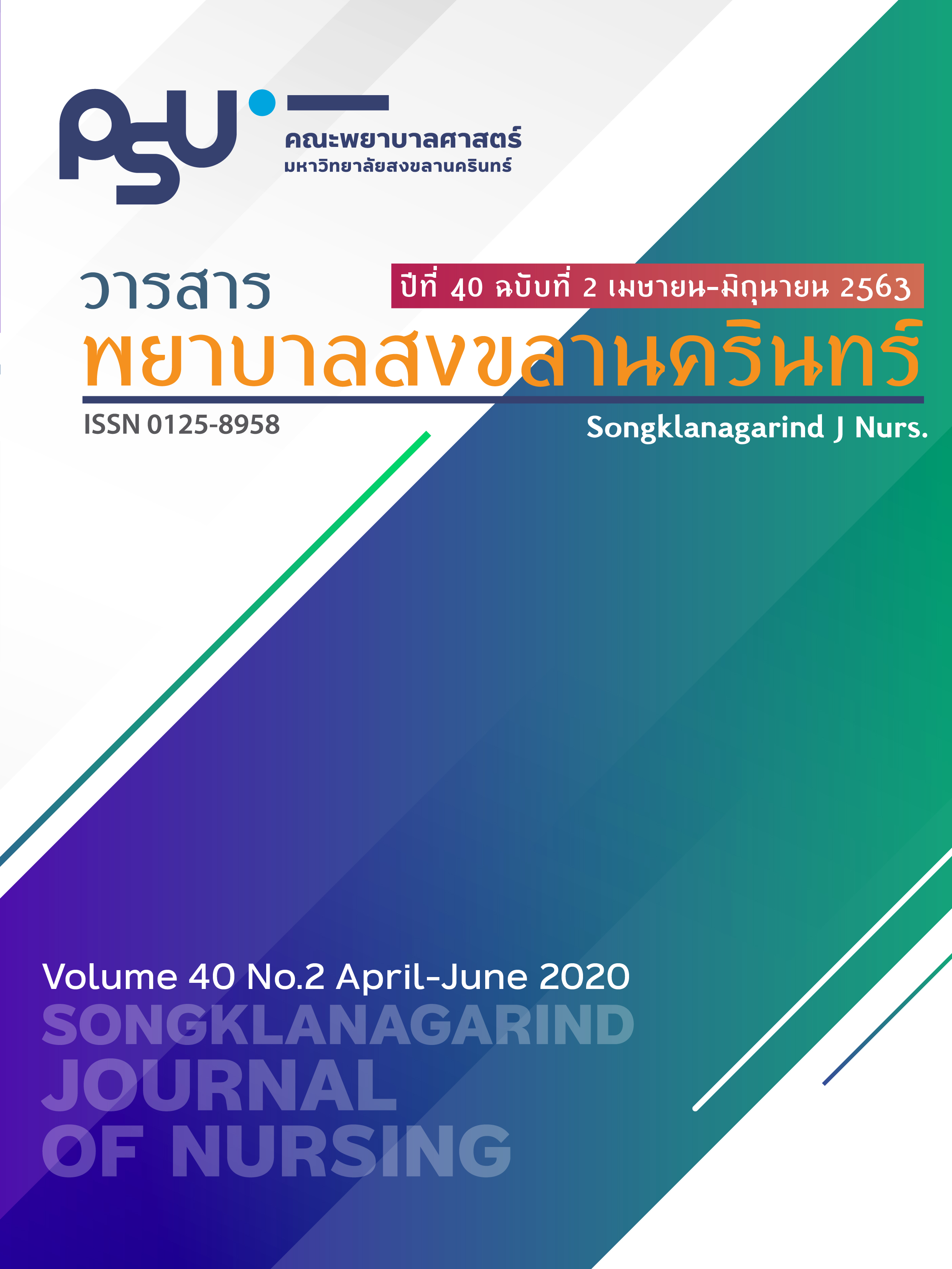Relationships between Extreme Heat, Environmental Factors Related to Extreme Heat and Admission Rates of Acute Kidney Injury in the High Temperature Provinces of Thailand
Main Article Content
Abstract
It is well known that extreme heat affects human health. Although it has been found to increase renal morbidity, there are few studies on renal outcome. The aim of this study was to investigate the relationship between extreme heat, environmental factors related to extreme heat, and admission rates of acute kidney injury in the high temperature provinces of Thailand. This study collected in a crosssectional study included 21,090 patients who admitted to the provincial hospital in Kanchanaburi, Nakhon Sawan and Uttaradit provinces with acute kidney injury (ICD10; N17), by collecting data from medical records and the daily data of weather conditions such as temperature, relative humidity and wind speed over the 4-year period (Year 2015-2018) gathered from Thai Meteorological Department. This data were analyzed using descriptive statistics, Generalized Estimating Equations and Negative Binomial Regression
The study demonstrated high admission rates of acute kidney injury in both summer and winter. The extreme heat effects on acute kidney injury admission were statistically significant. For each 1 ◦C increase in maximum temperature was associated with an increasing acute kidney injury admission (IRR1.06, 95%CI: 1.030-1.097) and a 1 km/h increase in wind speed was associated with a decreasing acute kidney injury admission (IRR0.92, 95%CI: 0.879-0.959). Therefore, monitoring the impact on kidney during hot weather is very important. These findings may have implications for developing intervention strategies such as avoid the heat, drink plenty of fluids, and stay in good air movement in order to decrease admission rates of acute kidney injury especially in Risk-prone areas of Thailand.
Article Details
References
IPCC. Climate change 2014: Impact, Adaption and Vulnerabilitiy. Part A: Global and sectoral aspects. Contribution of working group II to the fifth assessment report of the Intergovermental panel on Climate change, United Kingdom and Newyork, USA; 2014 1132 p.
Williams WJ, Musolin K, Coca A, et al. Criteria for a recommended standard: occupational exposure to heat and hot environments. OH: U.S. Department of Health and Human Services, Centers for disease control and prevention, National institute for Occupational Safety and Health. 2016.
U.S. Global Change Research Program (USGCRP) Climate and Health Assessment. Climate change and extreme heat: What you can do to prepare [Internet]. 2016 [Cited 2018 Dec 15]. Available from: https://health2016. globalchange.gov/
Tmd.go.th [homepage on the Internet]. Seasons in Thailand. Bangkok: Thai Meteorological Deparment; 2016 [cited 2018 Nov 5]. Available from: http://www.tmd.go.th/info/info.php? FileID=23
HIA.anamai.moph.go.th [homepage on the Internet]. The effect of heat on human health. Bangkok: Department of Health; 2016 [cited 2018 Nov 2]. Available from: http:// hia. anamai.moph.go.th/download/hia/manual/ book/ book61.pdf
Smith DL, Deblois JP, Haller JM, et al. Effect of heat stress and dehydration on cardiovascular function. [internet]. 2015 [cited 2018 Nov 3]. Available from: https://www. skidmore.edu/responder/documents/smith -dhsS10-fs-report.pdf
Glaser J, Lemery J, Rajagopalan B, et al. Climate Change and the Emergent Epidemic of CKD from Heat Stress in Rural Communities: The Case for Heat Stress Nephropathy. Clin J Am Soc Nephrol. 2016; 11(8): 1472-83. doi: 10.2215/CJN.13841215.
Borg M, Bi P, Nitschke M, et al. McDonald S. The impact of daily temperature on renal disease incidence: an ecological study. Environ Health. 2017; 16(1): 114. doi: 10.1186/ s12940-017-0331-4.
Isaksen TB, Yost MG, Hom EK, et al. Increased hospital admissions associated with extreme- heat exposure in King County, Washington, 1990-2010. Rev Environ Health. 2015; 30(1): 51-64. doi: 10.1515/reveh-2014-0050
Ogbomo AS, Gronlund CJ, O’Neill MS, et al. Vulnerability to extreme-heat-associated hospitalization in three counties in Michigan, USA, 2000-2009. Int J Biometeorol. 2017; 61(5):833-43. doi: 10.1007/s00484-016-1261-5.
Bai L, Cirendunzhu, Woodward A, et al. Temperature, hospital admissions and emergency room visits in Lhasa, Tibet: a time-series analysis. Sci Total Environ. 2014; 490: 838–48. doi: https:// doi.org/10.1016/j.scitotenv.2014.05.024
Tmd.go.th. [homepage on the Internet]. Seasons in Thailand. Bangkok: Thai Meteorological Deparment; 2016 [cited 2018 Nov 5]. Available from: http://www.tmd.go.th/info/info.php?File ID=53
Thao Vu, Helena Hurst. Acute kidney injury in Australia: a first national snapshot. Australian Institute of Health and Welfare: Canberra: AIHW; 2015.
Coca, Steven G. Acute Kidney Injury in Elderly Persons. AJKD. 2010; 56(1): 122-31. doi: https://doi.org/10.1053/j.ajkd.2009.12.034
Yamada S, Shimomura Y, Ohsaki M, et al. Hypothermia-induced acute kidney injury in a diabetic patient with nephropathy and neuropathy. Intern Med. 2010; 49(2): 171-4.
Tmd.go.th [homepage on the Internet]. Seasons in Thailand. Bangkok: Thai Meteorological Department; 2016 [cited 2018 Nov 5]. Available from: http://www.tmd.go.th/info/ info.php?FileID=89


